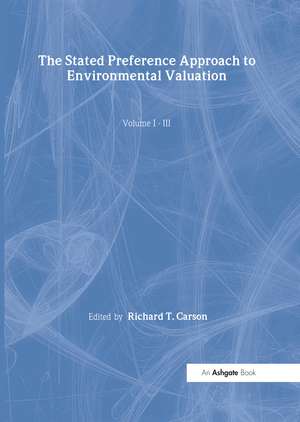The Stated Preference Approach to Environmental Valuation, Volumes I, II and III: Volume I: Foundations, Initial Development, Statistical Approaches Volume II:Conceptual and Empirical Issues Volume III: Applications: Benefit-Cost Analysis and Natural Resource Damage Assessment: The International Library of Environmental Economics and Policy
Editat de Richard T. Carsonen Limba Engleză Hardback – 28 noi 2007
Preț: 3492.06 lei
Preț vechi: 4720.11 lei
-26% Nou
Puncte Express: 5238
Preț estimativ în valută:
668.21€ • 699.43$ • 556.16£
668.21€ • 699.43$ • 556.16£
Comandă specială
Livrare economică 10-24 martie
Doresc să fiu notificat când acest titlu va fi disponibil:
Se trimite...
Preluare comenzi: 021 569.72.76
Specificații
ISBN-13: 9780754623342
ISBN-10: 0754623343
Pagini: 1880
Dimensiuni: 169 x 244 x 140 mm
Greutate: 0.45 kg
Ediția:1
Editura: Taylor & Francis
Colecția Routledge
Seria The International Library of Environmental Economics and Policy
Locul publicării:Oxford, United Kingdom
ISBN-10: 0754623343
Pagini: 1880
Dimensiuni: 169 x 244 x 140 mm
Greutate: 0.45 kg
Ediția:1
Editura: Taylor & Francis
Colecția Routledge
Seria The International Library of Environmental Economics and Policy
Locul publicării:Oxford, United Kingdom
Cuprins
Contents: Volume I: Foundations, Initial Development, Statistical Approaches: Introduction; Part I Conceptual and Theoretical Foundations: The four consumer surpluses, J.R. Hicks; The interpretation of voting in the allocation of economic resources, Howard R. Bowen; Capital returns from soil conservation practices, S.V. Ciriacy-Wantrup; The life you save may be your own, T.C. Schelling; The pure theory of public expenditure, Paul A. Samuelson; Wilderness areas: an extra-market problem in resource allocation, L. Gregory Hines; Conservation reconsidered, John V. Krutilla; Collective-consumption services of individual-consumption goods, Burt A. Weisbrod; Environmental preservation, uncertainty, and irreversibility, Kenneth J. Arrow and Anthony C. Fisher. Part II Early Applications: The value of big game hunting in a private forest, Robert K. Davis; Congestion, quality deterioration, and optimal use: wilderness recreation in the Spanish Peaks primitive area, Charles J. Cicchetti and V. Kerry Smith; Measuring benefits generated by urban water parks, Arthur H. Darling; Congestion and willingness to pay: a study of beach use, Kenneth E. McConnell; Bidding games for the valuation of aesthetic environmental improvements, Alan Randall, Berry Ives and Clyde Eastman; The valuation of aesthetic preferences, David S. Brookshire, Berry C. Ives and William D. Schulze; The demand for clean water: the case of the Charles River, Frederick W. Gramlich; Option value: empirical evidence from a case study of recreation and water quality, Douglas A. Greenley, Richard G. Walsh and Robert A. Young; Measuring values of extra-market goods: are indirect measures biased? Richard C. Bishop and Thomas A. Heberlein; Application of stochastic choice modelling to policy analysis of public goods: a case study of air quality improvements, Edna Loehman and Vo Hu De. Part III Early Tests of Validity: Comparisons of methods for resource evaluation, Jack L. Knetsch and Robert K. Davis; Estimating demand for public goods: an experiment, Peter Bohm; Valuing public goods: a comparison of survey and hedonic approaches, David S. Brookshire, Mark A. Thayer, William D. Schulze, Ralph C. d'Arge; Contingent valuation techniques for assessing environmental impacts: further evidence, Mark A. Thayer; Valuing environmental commodities: some recent experiments, William D. Schulz, Ralph C. d'Arge and David S. Brookshire; Effect of distance on the preservation value of water quality, Ronald J. Sutherland and Richard G. Walsh; Option price estimates for water quality improvements: a contingent evaluation study for the Monongahela River, William H. Desvousges, V. Kerry Smith and Ann Fisher; Pricing environmental health risks: survey assessments of risk-risk and risk-dollar trade-offs for chronic bronchitis, W. Kip Viscusi, Wesley A. Magat and Joel Huber. Part IV Statistical Approaches: Welfare evaluations in contingent valuation experiments with discrete responses, Michael W. Hanemann; Efficient estimation methods for 'closed-ended' contingent valuation surveys, Trudy Ann Cameron and Michelle D. James; A new paradigm for valuing non-market goods using referendum data: maximum likelihood estimation by censored logistic regression, Trudy Ann Cameron; Models for referendum data: the structure of discrete choice models for contingent valuation, K.E. McConnell; Contingent valuation and social choice, Daniel McFadden; Confidence intervals for evaluating benefits estimates from dichotomous choice contingent valuation studies, Timothy Park, John B. Loomis and Michael Creel; A non-parametric approach to the estimation of welfare measures in discrete response valuation studies, Bengt Kriström; Experimental design for discrete choice voter preference surveys, Richard T. Carson and Dan Steinberg; Referendum models and negative willingness to pay: alternative solutions, Timothy C. Haab and Kenneth E. McConnell; Spike models in contingent valuation, Bengt Kriström; Allowing for zeros in dichotomous-choice contingent-valuation models, Megan Werner; Bias in discrete response contingent valuation, Barbara J. Kanninen; Statistical efficiency of double-bounded dichotomous choice contingent valuation, Michael Hanemann, John Loomis and Barbara Kanninen; Modeling response incentive effects in dichotomous choice contingent valuation data, Anna Alberini, Barbara Kanninen and Richard T. Carson; Referendum contingent valuation estimates: sensitivity to assignment of offered values, Trudy Ann Cameron and Daniel D. Huppert; Optimal designs for discrete-choice contingent valuation surveys: single-bound, double-bound and bivariate models, Anna Alberini; Name index. Volume II: Conceptual and Empirical Issues: Introduction; Part I Conceptual Issues: Overviews of the Debate: Contingent valuation ; a user's guide, Richard T. Carson; Beyond the crucial experiment: mapping the performance characteristics of contingent valuation, Alan Randall; Administering contingent valuation surveys in developi
Notă biografică
Richard T Carson is Professor in the Department of Economics, University of California - San Diego, USA.
Descriere
There is a truly enormous literature on using stated preference information to place a monetary value on environmental amenities. This three volume set provides the key papers for understanding the historical development of contingent valuation, its theoretical and statistical foundations, and the major controversies. It also contains representative papers covering all of the major application areas in environmental valuation.







